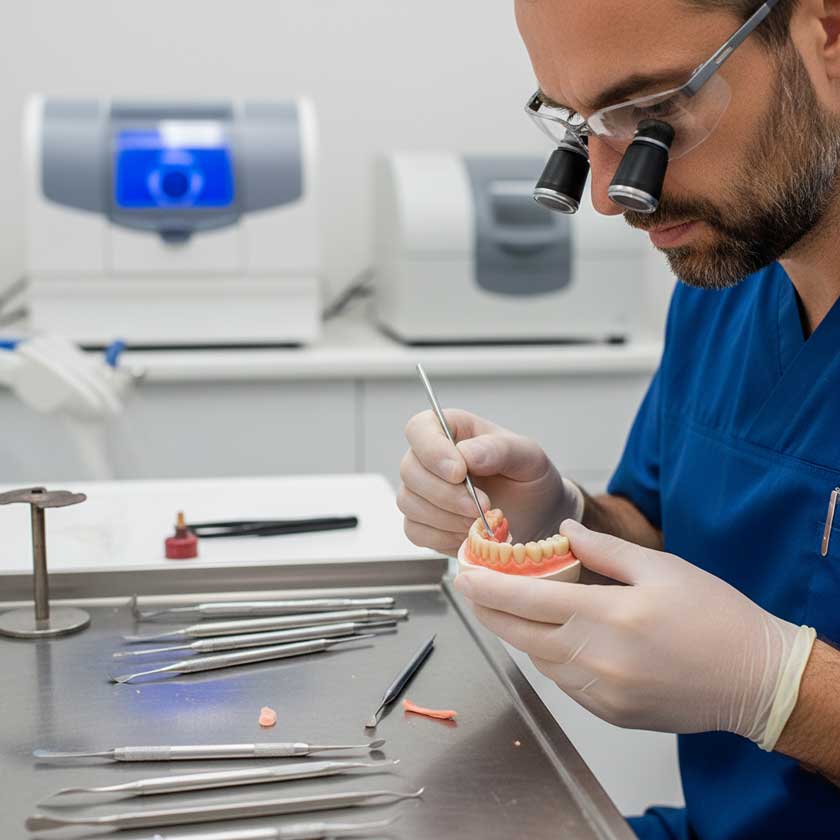Dental implants and dentures are commonly considered tooth replacement options. Dental implants use titanium posts in the jawbone to replace missing teeth with crowns or bridges. On the other hand, dentures are removable prosthetics that replace multiple or all teeth. Choosing between dental implants and dentures requires careful consideration of factors such as the jawbone's condition, cost, durability, and individual preferences.
Key Takeaways:
- Dental implants involve placing titanium posts in the jawbone and attaching dental crowns or bridges.
- Dentures are removable prosthetics used to replace multiple or all teeth.
- Factors to consider when choosing between dental implants and dentures include jawbone condition, cost, durability, and personal preferences.
- Dental implants help with biting and chewing and prevent bone loss, but they need surgery and take longer to heal.
- Dentures improve your smile and require fewer dental visits. However, they may initially affect speech and can cause sore spots.

Advantages and disadvantages of dental implants.
Dental implants offer several advantages for tooth replacement. One major advantage is their ability to provide improved biting force and chewing ability. Like natural teeth, dental implants allow individuals to enjoy a wide range of foods without limitations. This can significantly enhance their overall eating experience, improving nutrition and satisfaction.
Another benefit of dental implants is their ability to prevent bone loss in the jaw. When a tooth is missing, the underlying jawbone can deteriorate over time, leading to further oral health complications. Dental implants, however, act as artificial tooth roots and stimulate the jawbone, helping to maintain its strength and density.
Dental implants can last a long time with proper care and maintenance. This means that individuals can enjoy their new teeth for many years, increasing their overall convenience and satisfaction. Regular cleaning and check-ups are essential for maintaining the health and longevity of dental implants.
"Dental implants provide improved biting force and chewing ability and can prevent bone loss in the jaw."
However, it's also essential to consider the disadvantages of dental implants. One primary disadvantage is the requirement for implant surgery. This surgery puts titanium posts in the jawbone, which takes a long time and is invasive.
In some cases, bone grafting may be necessary before implant surgery to ensure enough bone to support the implants. This additional procedure can increase the overall treatment time and cost.
Speaking of cost, dental implants can be more expensive compared to dentures. Dental implants cost more initially, and insurance may not cover them fully, so some people have to pay a lot.
"Dental implants require surgical procedures and can be more expensive than dentures."
Despite these disadvantages, dental implants are popular for tooth replacement due to their durability and longevity. They offer a more natural and permanent solution than dentures, providing individuals with confidence and improved oral function.
Advantages and disadvantages of dentures.
Dentures offer a range of advantages and disadvantages for individuals considering them as a tooth replacement option. Understanding these factors is crucial to making an informed decision about your dental health and overall well-being.
Aesthetics and smile
Dentures can improve the appearance of your smile, enhancing your facial aesthetics and boosting your self-esteem. You can make dentures look natural and match your preferences by customizing their appearance.
Speech
While dentures may initially affect your speech as you adjust to wearing them, this challenge can be overcome with practice and time. Speech patterns typically normalize as you become accustomed to wearing dentures.
Comfort
Comfort levels with dentures can vary among individuals. Some people may be comfortable, while others may experience mild discomfort or adjustment issues. Dentures should fit securely in your mouth to ensure optimal comfort.
Dental Visits
Compared to dental implants, dentures generally require fewer dental visits. Regular check-ups and adjustments to your dentures help maintain their fit and functionality over time.
Gum and bone health
Dentures can contribute to the health of your gums and jawbone by providing support and preventing further bone loss. Unlike dental implants, dentures do not require invasive surgery or impact the bone structure directly.
Infection risk
Proper cleaning and hygiene practices are necessary to minimize the risk of denture infections. Regular cleaning and soaking your dentures in a denture cleanser can help maintain oral health and prevent oral infections.
Looseness
In some cases, dentures may become loose over time due to changes in the shape of your jawbone or natural wear and tear. Loose dentures can cause discomfort and affect their functionality. However, adjustments or replacements can address this issue.
Choosing dentures as a tooth replacement option offers aesthetic benefits, requires fewer dental visits, and can contribute to gum and bone health. However, it's essential to consider factors such as initial speech adjustments, comfort levels, infection risk, and the potential for dentures to become loose over time.
Factors to consider when choosing between dental implants and dentures.
Choosing between dental implants and dentures involves considering several factors. It's essential to explore options such as all-on-four implants, snap-in dentures, mini implants, same-day dentures, and implant-supported dentures to determine which suits individual needs and requirements.
One crucial factor to consider is the success rate and potential implant failure associated with dental implants. Understanding the long-term prognosis and the risks involved will help make an informed decision.
Additionally, oral hygiene practices play a significant role in maintaining dental health. Regular brushing, flossing, and dental visits are essential for dental implants and dentures.
The age factor is another crucial consideration. Younger individuals may benefit from procedures such as mini implants that require less invasive surgery, while older individuals may need dentures due to bone loss or health conditions.
Overall health conditions and lifestyle factors are also essential to consider. Some health conditions may affect the success of implant surgery or increase the risk of implant failure. Lifestyle factors such as smoking or grinding teeth may also impact the longevity of dental implants.
Eating challenges are a consideration for individuals with missing teeth. Dental implants offer excellent stability and chewing ability compared to dentures, which may be more suitable for those with difficulty with certain foods.
"Choosing the right tooth replacement option requires careful consideration of various factors, such as the success rate, oral hygiene, age, overall health conditions, lifestyle factors, and eating challenges." - Dr. Emily Davis, Dental Specialist.
Ultimately, the decision between dental implants and dentures depends on a combination of personal preferences and the evaluation of all these factors. It's recommended to consult with a dental professional to discuss individual needs and determine the most suitable solution for optimal dental health and function.
How to make the right choice between Dental Implants and Dentures
Assessing individual needs and preferences is essential when considering tooth replacement options, such as dental implants and dentures. Factors such as the number of missing teeth, overall dental health, and the potential benefits of each option play a crucial role in making the right choice.
Dental implants are an excellent solution for single-tooth replacement. They involve the use of titanium posts surgically placed in the jawbone. These implants provide a more permanent and stable solution, mimicking the function and appearance of natural teeth. Dental implants can last a lifetime with proper care, enhancing dental and oral health.
Dentures, on the other hand, are an ideal choice for multiple teeth replacement. They are removable dental prosthetics that offer a more affordable alternative. Dentures eliminate gaps caused by missing teeth, restoring the aesthetics of your smile and boosting confidence. With regular dental visits and proper care, dentures can provide satisfactory results for dental restoration.
"Dental health is essential for overall well-being. You can find the perfect dental restoration option by considering factors like the number of missing teeth, overall dental health, and individual preferences."
Consulting with a dental specialist is highly recommended when deciding tooth replacement options. The specialist will carefully assess your dental health, oral health, and specific requirements to determine the most suitable solution for you. If necessary, they will address any concerns or questions and guide you through the dental surgery process.
- Perform a thorough evaluation of your dental health.
- Consider the pros and cons of dental implants and dentures.
- Weigh the benefits of single tooth replacement versus multiple teeth replacement.
- Discuss the potential long-term advantages of dental implants, such as improved oral health and stability.
- Take into account the affordability and convenience of dentures.
Remember, making an informed decision about tooth replacement options is crucial for long-term dental health and overall well-being. By carefully considering your circumstances and seeking professional guidance, you can confidently choose the dental restoration option that suits you best.
Get a professional opinion.
When choosing between dental implants and dentures, making a decision that aligns with your circumstances and preferences is crucial. Dental implants offer exceptional durability and a natural feel that resembles your teeth. On the other hand, dentures are more affordable and offer significant aesthetic benefits.
In making your choice, it is essential to consider various factors that affect your dental health and overall well-being. This includes evaluating the impact on gum health, bone health, and the risk of infections. Additionally, aesthetics, such as your smile and speech, comfort, and self-esteem, are essential considerations.
It is highly recommended to consult with a dental professional to ensure that you make an informed decision and achieve optimal dental health and function. They can provide expert guidance based on your unique situation and help you choose the most suitable option.
FAQ
What are dental implants and dentures?
Dental implants are titanium posts surgically placed in the jawbone and used to attach dental crowns or bridges. Dentures are removable prosthetics that replace multiple or all teeth.
What are the advantages and disadvantages of dental implants?
Dental implants offer improved biting force and chewing ability, prevent bone loss in the jaw, and can last long. However, they require implant surgery, have a longer healing time, and can be more expensive.
What are the advantages and disadvantages of dentures?
Dentures improve aesthetics, require fewer dental visits, and can contribute to gum and bone health. They might initially affect speech, be less comfortable than implants, and need proper cleaning to prevent infections or looseness.
What factors should you consider when choosing between dental implants and dentures?
Factors to consider include implant options (all-on-four, snap-in dentures, etc.), implant failure rates, oral hygiene practices, age, health conditions, lifestyle factors, and eating challenges.
How can one make the right choice between dental implants and dentures?
When making a choice, it is important to consider personal needs. These needs may include the number of missing teeth, overall dental health, and desired benefits from each option. Dental implants are suitable for single-tooth replacement, while dentures are affordable for multiple teeth replacement.








